Submitted:
30 September 2024
Posted:
01 October 2024
You are already at the latest version
Abstract
Keywords:
1. Introduction
1.1. Education for Sustainable Development
1.2. Competence-Based Approach in ESD
1.3. ESD in Secondary School Education
1.4. Research Aim
- Which types of competencies are discussed and evaluated in the selected articles?
- What settings or backgrounds influence the emergence of competency frameworks?
- How do competency frameworks for secondary schools differ from those in other areas such as higher education?
2. Materials and Methods
2.1. Procedure of the Scoping Literature Review
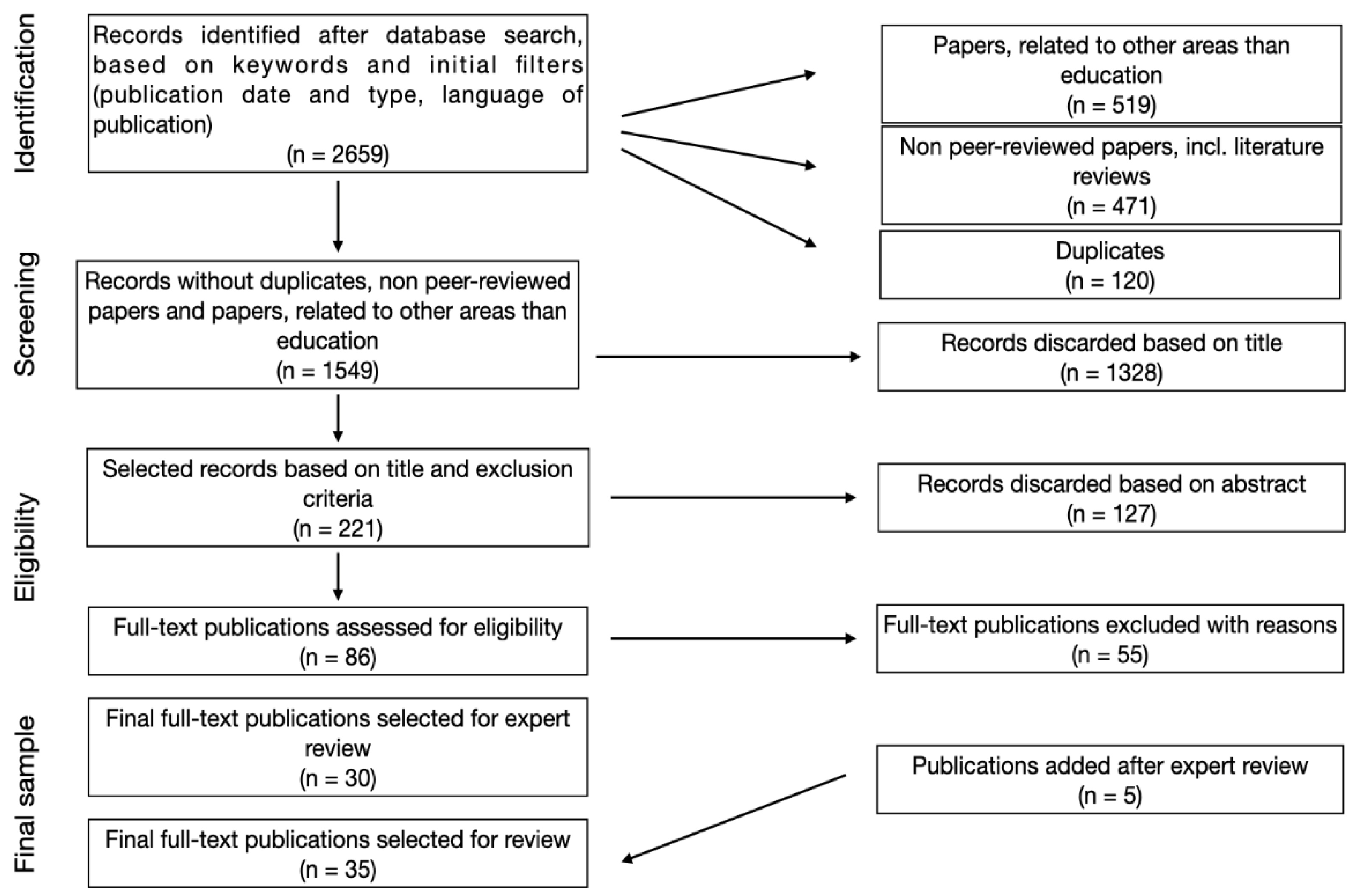
2.2. Analysis Framework
3. Results
3.1. Methodological Qualitative Approach: Type of Sustainability Competencies
- as a set of transversal competencies for curricula or a certain education area;
- as a structured framework model for development and assessment of sustainability-related knowledge, skills, attitudes and behavior in the educational process.
3.1.1. The prevailing conceptual approaches
3.1.2. Clustering Based on Shared Perspectives
3.1.3. List of the Most Cited Sources
3.1.4. Word Cloud of All Mentioned Sustainability Competencies
3.2. Quantitative Analysis
3.2.1. Relevant Journals and Time Range of the Selected Articles
3.2.2. Geographical Distribution by Countries and Academic Institutions
3.2.3. Analysis of Authorship
3.2.4. Type of Research
3.2.5. Teaching-Learning Methods
3.2.6. Keywords Approach
4. Discussion
4.1. Overview of Sustainability Competencies Research in Secondary Education
4.2. Consensus on sustainability competencies
- The structure of sustainability competence is delineated into three main components: cognitive, emotional-motivational, and behavioral. It is also recognized as a cluster of cognitive and non-cognitive dimensions: knowledge, skills, values, emotions and attitudes [17]. In particular, these different dimensions are presented, e.g., in the concept of sustainability consciousness, which encompasses students’ knowingness, attitudes, and behavior in relation to the sub-themes to the environmental, social, and economic dimensions of sustainable development [61]. Researchers from South Korea categorize sustainability competencies into three domains based on this structure: intellect-oriented, personality-oriented, and relationship-oriented domains [15]. The methods mentioned in the selected papers, especially holistic and pluralistic learning, are also designed to foster all significant components of sustainability competencies simultaneously.
- The functional features of sustainability competence/competencies, particularly the potential ability of learners to contribute to the well-functioning society based on principles of human rights, social, economic, and ecological responsibility, and their capacity to "cope successfully with complex demands and challenges across a wide spectrum of relevant contexts and domains" [97] (p. 321), also find common understanding among the majority of researchers. Notably, the concept of shaping competence (Gestaltungskompetenz) is considered a "specific capacity to act and solve problems" [11] (p. 320) or "to change in future the social relationships, to empower the learners to contribute to the social development processes" [77] (p. 11). The concept of action competence includes the “capacity to be able to act, now and in the future, and to be responsible for one's actions” [66] (p.175).These concepts exemplify the inclusion of functional dimensions into the subsets of sustainability competencies. In essence, the functionality of sustainability competence lies in the disposition of knowledge, skills, values, and attitudes that empower learners to make informed decisions and take meaningful actions. This empowerment aims to shape the future of societies towards a fairer way of life for people and nature, aligning with the UNESCO Roadmap for the Global Action Programme on ESD [1].
- Another shared feature about sustainability competencies among the majority of researchers is their transversality or cross-cutting dimension, signifying the applicability of sustainability competencies across various education areas and subject domains starting from classroom level and up to the level of national education policies. Researchers are expanding the scope of sustainability competencies beyond the school curriculum and into the domain of engagement with school administrators, local partners, and the community by choosing and experimenting with different teaching-learning methodologies [72,78,85,89,95]. For secondary school education, this feature is crucial in preparing learners to consider and act effectively in various areas of life, where they may encounter challenges related to sustainability.
4.2. Gaps and inconsistencies in research within this educational field
5. Conclusions
- broad diversity of approaches to conceptualization of sustainability competencies for the secondary school level worldwide;
- identification of shared perspectives among the researchers, despite of their geographical and cultural backgrounds;
- categorization of main approaches within shared perspectives based on priorities and research interests of various researchers;
- focus on certain foundational sustainability competencies that are considered relevant across various educational domains of sustainability education at secondary school level;
- emphasis on cognitive, affective, and behavioral aspects among almost all identified approaches which indicated a worldwide acknowledged holistic approach to competency development.
Supplementary Materials
Funding
Data Availability Statement
Conflicts of Interest
References
- UNESCO. Education for Sustainable Development: Roadmap; UNESCO: Paris, France, 2020; ISBN 978-92-3-100394-3. [Google Scholar]
- UNESCO. What do you need to know about education for sustainable development? UNESCO Homepage. Available online: https://www.unesco.org/en/sustainable-development/education/need-know?hub=72522 (accessed on 14 May 2023).
- Delors, J.; et al. Learning: The treasure within; Report to UNESCO of the International Commission on Education for the 21st Century; UNESCO: Paris, 1996; ISBN -92-3-103274-7. [Google Scholar]
- UNESCO. Education for Sustainable Development Toolkit; UNESCO: Paris, 2002; Available online: https://unesdoc.unesco.org/ark:/48223/pf0000152453 (accessed on 12 May 2023).
- De Haan, G. Gestaltungskompetenz als Kompetenzkonzept der Bildung für nachhaltige Entwicklung. In Kompetenzen der Bildung für nachhaltige Entwicklung: Operationalisierung, Messung, Rahmenbedingungen, Befunde; Bormann, I., de Haan, G., Eds.; VS Verl. für Sozialwissenschaften: Wiesbaden, 2008; pp. 23–43. ISBN 978-3-531-15529-6. [Google Scholar]
- UNESCO. Rethinking Education. Towards a global common good? UNESCO: Paris, France, 2015; Available online: http://unesdoc.unesco.org/images/0023/002325/232555e.pdf (accessed on 16 October 2023).
- Redman, A.; Wiek, A.; Barth, M. Current practice of assessing students’ sustainability competencies: A review of tools. Sustain Sci 2021, 16, 117–135. [Google Scholar] [CrossRef]
- Cebrián, G.; Junyent, M.; Mulà, I. Competencies in Education for Sustainable Development: Emerging Teaching and Research Developments. Sustainability 2020, 12, 579. [Google Scholar] [CrossRef]
- Scharenberg, K.; Waltner, E.-M.; Mischo, C.; Rieß, W. Development of Students’ Sustainability Competencies: Do Teachers Make a Difference? Sustainability 2021, 13, 12594. [Google Scholar] [CrossRef]
- Elder, S.; Wittman, H.; Giang, A. Building sustainability research competencies through scaffolded pathways for undergraduate research experience. Elem Sci Anth 2023, 11, 00091. [Google Scholar] [CrossRef]
- de Haan, G. The Development of ESD-Related Competencies in Supportive Institutional Frameworks. Int Rev Educ 2010, 56, 315–328. [Google Scholar] [CrossRef]
- Mogensen, F.; Schnack, K. The Action Competence Approach and the “New” Discourses of Education for Sustainable Development, Competence and Quality Criteria. Environ Educ Res 2010, 16, 59–74. [Google Scholar] [CrossRef]
- Fischer, D.; Barth, M. Key Competencies for and beyond Sustainable Consumption: An Educational Contribution to the Debate. GAIA - Ecological Perspectives for Science and Society 2014, 23, 193–200. [Google Scholar] [CrossRef]
- Carrascal, S.; Magro, M.; Anguita, J.M.; Espada, M. Acquisition of competences for sustainable development through visual thinking. A study in rural schools in Mixco, Guatemala. Sustainability 2019, 11, 2317. [Google Scholar] [CrossRef]
- Seo, E.; Ryu, J.; Hwang, S. Building key competencies into an environmental education curriculum using a modified Delphi approach in South Korea. Environ Educ Res 2020, 26, 890–914. [Google Scholar] [CrossRef]
- Napal, M.; Mendióroz-Lacambra, A.M.; Penalva, A. Sustainability teaching tools in the digital age. Sustainability 2020, 12, 3366. [Google Scholar] [CrossRef]
- Organisation for Economic Co-operation and Development (OECD). Definition and selection of key competencies. Executive summary; OECD: Paris, 2005; Available online: https://www.oecd.org/pisa/35070367.pdf (accessed on 16 October 2023).
- Laurie, R.; Nonoyama-Tarumi, Y.; Mckeown, R.; Hopkins, C. Contributions of Education for Sustainable Development (ESD) to Quality Education: A Synthesis of Research. J Educ Sustain Dev 2016, 10. [Google Scholar] [CrossRef]
- Rieckmann, M. Learning to transform the world: Key competencies in Education for Sustainable Development. In Issues and trends in education for sustainable development; Leicht, A., Heiss, J., Byun, W.J., Eds.; UNESCO: Paris, 2018; pp. 39–59. [Google Scholar]
- Wiek, A.; Withycombe Keeler, L.; Redman, C.L. Key competencies in sustainability: A reference framework for academic program development. Sustain Sci 2011, 6, 203–218. [Google Scholar] [CrossRef]
- Cebrián, G.; Junyent, M. Competencies in education for sustainable development: Exploring the student teachers’ views. Sustainability 2015, 7, 2768–2786. [Google Scholar] [CrossRef]
- Weinert, F. Competencies and Key Competencies: Educational Perspective. International encyclopedia of the social and behavioral sciences, 2001, 2433-2436. [CrossRef]
- Schreiber, J.R.; Siege, H. Orientierungsrahmen für den Lernbereich Globale Entwicklung im Rahmen einer Bildung für nachhaltige Entwicklung: Ein Beitrag zum Weltaktionsprogramm'Bildung für nachhaltige Entwicklung: Ergebnis des gemeinsamen Projekts der Kultusministerkonferenz (KMK) und des Bundesministeriums für wirtschaftliche Zusammenarbeit und Entwicklung (BMZ), 2. aktualisierte und erweiterte Auflage, 2016. Available online: https://www.globaleslernen.de/sites/default/files/files/link-elements/orientierungsrahmen_fuer_den_lernbereich_globale_entwicklung_barrierefrei.pdf (accessed on 19 May 2023).
- UNESCO. Education for Sustainable Development Goals. Learning Objectives; UNESCO: Paris, France, 2017; Available online: https://www.unesco.de/sites/default/files/2018-08/unesco_education_for_sustainable_development_goals.pdf (accessed on 10 May 2023).
- Waltner, E.-M.; Rieß, W.; Mischo, C. Development and validation of an instrument for measuring student sustainability competencies. Sustainability 2019, 11, 1717. [Google Scholar] [CrossRef]
- Barth, M.; Michelsen, G.; Rieckmann, M.; Thomas, I. Routledge handbook of higher education for sustainable development, 1st ed.; Routledge: London, 2015. [Google Scholar] [CrossRef]
- Lozano, R.; Merrill, M.Y.; Sammalisto, K.; Ceulemans, K.; Lozano, F.J. Connecting Competencies and Pedagogical Approaches for Sustainable Development in Higher Education: A Literature Review and Framework Proposal. Sustainability 2017, 9, 1889. [Google Scholar] [CrossRef]
- Brundiers, K.; Barth, M.; Cebrián, G.; Rieckmann, M.; Cohen, M.; Diaz, L.; Doucette, S.; Dripps, W.R.; Habron, G.; Harre, N.; et al. Key competencies in sustainability in higher education—Toward an agreed-upon reference framework. Sustain Sci 2021, 16, 13–29. [Google Scholar] [CrossRef]
- Rieckmann, M. Future-oriented higher education: Which key competencies should be fostered through university teaching and learning? Futures 2011, 44, 127–135. [Google Scholar] [CrossRef]
- Kamis, A.; Rus, R.C.; Rahim, M.B.; Yunus, F.A.N.; Zakaria, N.; Affandi, H.M. Exploring green skills: A study on the implementation of green skills among secondary school students. Int J Acad Res Bus Soc Sci 2017, 7, 327–345. [Google Scholar] [CrossRef]
- Corres, A.; Rieckmann, M.; Espasa, A.; Ruiz-Mallén, I. Educator Competencies in Sustainability Education: A Systematic Review of Frameworks. Sustainability 2020, 12, 9858. [Google Scholar] [CrossRef]
- Rieckmann, M.; Barth, M. Development. In Competencies in Education for Sustainable Development: Critical Perspectives; Vare, P., Lausselet, N., Rieckmann, M., Eds.; Springer International Publishing: Cham, 2022; pp. 19–26. ISBN 978-3-030-91055-6. [Google Scholar]
- Bürgener, L.; Barth, M. Sustainability competencies in teacher education: Making teacher education count in everyday school practice. J Clean Prod 2018, 174, 821–826. [Google Scholar] [CrossRef]
- Sleurs, W. Competencies for ESD Teachers: A Framework to Integrate ESD in the Curriculum of Teacher Training Institutes; Curriculum, Sustainable Development, Competencies, Teacher Training (CSCT) Comenious 2.1 Project; UN: Brussels, Belgium, 2008; Available online: https://www.unece.org/fileadmin/DAM/env/esd/inf.meeting.docs/EGonInd/8mtg/CSCT%20Handbook_Extract.pdf (accessed on 22 October 2022).
- Garcia, M.R.; Junyent, M.; Fonolleda, M. How to assess professional competencies in Education for Sustainability? An approach from a perspective of complexity. Int J Sustain High Educ 2017, 18, 772–797. [Google Scholar] [CrossRef]
- Rauch, F.; Steiner, R. Competencies for Education for Sustainable Development in Teacher Education. Cent. Educ. Policy Stud. J 2013, 3, 9–24. [Google Scholar] [CrossRef]
- Fischer, D.; King, J.; Rieckmann, M.; Barth, M.; Büssing, A.; Hemmer, I.; Lindau-Bank, D. Teacher Education for Sustainable Development: A Review of an Emerging Research Field. J Teach Educ 2022, 73, 509–524. [Google Scholar] [CrossRef]
- Brandt, J.O.; Bürgener, L.; Barth, M.; Redman, A. Becoming a competent teacher in education for sustainable development: Learning outcomes and processes in teacher education. Int J Sustain High Educ 2019, 20, 630–653. [Google Scholar] [CrossRef]
- Diep, P.C.; Hartmann, M. Green Skills in Vocational Teacher Education – a model of pedagogical competence for a world of sustainable development. TVET@ Asia 2016, 6, 1–19. [Google Scholar] [CrossRef]
- Alsina, Á.; Mulà, I. Advancing towards a transformational professional competence model through reflective learning and sustainability: The case of mathematics teacher education. Sustainability 2019, 11, 4039. [Google Scholar] [CrossRef]
- García-Rico, L.; Martínez-Muñoz, L.F.; Santos-Pastor, M.L.; Chiva-Bartoll, O. Service-learning in physical education teacher education: A pedagogical model towards sustainable development goals. Int J Sustain High Educ 2021, 22, 747–765. [Google Scholar] [CrossRef]
- Schuler, S.; Fanta, D.; Rosenkraenzer, F.; Riess, W. Systems thinking within the scope of education for sustainable development (ESD)–a heuristic competence model as a basis for (science) teacher education. J. Geogr. High. Educ 2018, 42, 192–204. [Google Scholar] [CrossRef]
- Ammoneit, R.; Turek, A.; Peter, C. Pre-service geography teachers’ professional competencies in education for sustainable development. Educ Sci. 2022, 12, 42. [Google Scholar] [CrossRef]
- Jegstad, K.M.; Sinnes, A.T. Chemistry teaching for the future: A model for secondary chemistry education for sustainable development. Int J Sci Educ 2015, 37, 655–683. [Google Scholar] [CrossRef]
- Gough, N.; Gough, A. The Green Schools Movement Around the World. Presented to Asian Studies faculty and students, University of Western Australia. Available online: https://www.researchgate.net/publication/332393660_The_Green_Schools_Movement_Around_the_World (accessed on 14 September 2022).
- UNESCO. Good practices in education for sustainable development in the UNECE region. Education for Sustainable Development in Action. Good Practices N° 2; UNESCO: Paris, 2007; Available online: https://unesdoc.unesco.org/ark:/48223/pf0000153319 (accessed on 12 May 2023).
- United Nations. The future we want. Outcome document of the United Nations Conference on Sustainable Development; UN: Rio de Janeiro, Brazil, 22 June 2012; Available online: https://sustainabledevelopment.un.org/futurewewant.html (accessed on 12 May 2023).
- UNECE. Engaging Young People in the Implementation of ESD in the UNECE Region: Good Practices in the Engagement of Youth; UNECE: Geneva, 2022; Available online: https://unece.org/sites/default/files/2022-09/Engaging_Young_People_web_final_05.09.2022.pdf (accessed on 12 August 2023).
- Deutsche UNESCO-Kommission. Praxisimpulse zur nachhaltigen Schulentwicklung. Beiträge der UNESCO-Projektschulen; Deutsche UNESCO-Kommission: Bonn, 2022; Available online: https://www.unesco.de/sites/default/files/2022- 03/Praxisimpulse_zur_nachhaltigen_Schulentwicklung_A4_Doppelseiten_web-final_0.pdf (accessed on 16 February 2023).
- Adomßent, M.; Hoffmann, T. The concept of competencies in the context of Education for Sustainable Development (ESD). ESD Expert Network: 2013. Available online: http://esd-expert.net/assets/130314-Concept-Paper-ESD-Competencies.pdf (accessed on 16 February 2023).
- Sund, P.; Gericke, N. Teaching contributions from secondary school subject areas to education for sustainable development – a comparative study of science, social science and language teachers. Environ Educ Res 2018, 26, 772–794. [Google Scholar] [CrossRef]
- Taylor, N.; Quinn, F.; Jenkins, K.; Miller-Brown, H.; Rizk, N.; Prodromou, T.; Taylor, S. Education for Sustainability in the Secondary Sector – a Review. J Educ Sustain Dev 2019, 13, 102–122. [Google Scholar] [CrossRef]
- Tejedor, G.; Segalas, J.; Barron, A.; Fernández, M.; Camacho, M.; Ruiz-Morales, J.; Blanco, I.; Esther, G.-G.; Aramburuzabala, P.; Hernández, À. Didactic Strategies to Promote Competencies in Sustainability. Sustainability 2019, 11, 2086. [Google Scholar] [CrossRef]
- Mathar, R. A whole school approach to sustainable development. In Schooling for Sustainable Development in Europe: Concepts, Policies and Educational Experiences at the End of the UN Decade of Education for Sustainable Development; Jucker, R., Mathar, R., Eds.; Springer International Publishing: Cham, 2014; pp. 15–30. ISBN 978-3-319-09548-6. [Google Scholar]
- Sass, W.; Boeve-de Pauw, J.; Olsson, D.; Gericke, N.; De Maeyer, S.; Van Petegem, P. Redefining action competence: The case of sustainable development. J Environ Educ 2020, 51, 292–305. [Google Scholar] [CrossRef]
- Wals, A.E. Mirroring, Gestaltswitching and transformative social learning: Stepping stones for developing sustainability competence. Int J Sustain High Educ 2010, 11, 380–390. [Google Scholar] [CrossRef]
- de Haan, G. The BLK ‘21’programme in Germany: A ‘Gestaltungskompetenz’-based model for Education for Sustainable Development. Environ Educ Res 2006, 12, 19–32. [Google Scholar] [CrossRef]
- Vesterinen, M.; Ratinen, I. Sustainability competences in primary school education –- a systematic literature review. Environ Educ Res 2024, 30, 56–67. [Google Scholar] [CrossRef]
- American Psychological Association (APA). Developing Adolescents: A Reference for Professionals. Washington: 2002. Available online: https://www.apa.org/pi/families/resources/develop.pdf (accessed on 14 April 2022).
- Olsson, D.; Gericke, N.; Boeve-de Pauw, J.; Berglund, T.; Chang, T. Green Schools in Taiwan: Effects on Student Sustainability Consciousness. Glob Environ Change 2019, 54, 184–194. [Google Scholar] [CrossRef]
- Boeve-de Pauw, J.; Gericke, N.; Olsson, D.; Berglund, T. The effectiveness of education for sustainable development. Sustainability 2015, 7, 15693–15717. [Google Scholar] [CrossRef]
- Munn, Z.; Peters, M.D.J.; Stern, C.; Tufanaru, C.; McArthur, A.; Aromataris, E. Systematic review or scoping review? Guidance for authors when choosing between a systematic or scoping review approach. BMC Med Res Methodol 2018, 18, 143. [Google Scholar] [CrossRef]
- Tricco, A.C.; Lillie, E.; Zarin, W.; O'Brien, K.K.; Colquhoun, H.; Levac, D.; Moher, D.; Peters, M.D.J.; Horsley, T.; McGowan; et al. PRISMA Extension for Scoping Reviews (PRISMA-ScR): Checklist and Explanation. Ann Intern Med 2018, 169, 467–473. [Google Scholar] [CrossRef] [PubMed]
- Gutierrez-Bucheli, L.; Reid, A.; Kidman, G. Scoping reviews: Their development and application in environmental and sustainability education research. Environ Educ Res 2022, 28, 645–673. [Google Scholar] [CrossRef]
- Armstrong, R.; Hall, B.J.; Doyle, J.; Waters, E. ‘Scoping the scope’ of a cochrane review. J Public Health 2011, 13, 147–150. [Google Scholar] [CrossRef] [PubMed]
- Jensen, B.B.; Schnack, K. The Action Competence Approach in Environmental Education. Environ Educ Res 1997, 3, 163–178. [Google Scholar] [CrossRef]
- Berglund, T.; Gericke, N.; Chang Rundgren, S. The implementation of education for sustainable development in Sweden: Investigating the sustainability consciousness among upper secondary students. Res Sci Technol Educ 2014, 32, 318–339. [Google Scholar] [CrossRef]
- Kamis, A.; Hussain, M.A.M.; Kob, C.G.C.; Yunus, F.A.N.; Rahim, M.B. Validity and reliability of green skills instrument. Sains Humanika 2018, 10. [Google Scholar] [CrossRef]
- Rieß, W.; Mischo, C.; Waltner, E.M. Ziele einer Bildung für nachhaltige Entwicklung in Schule und Hochschule: Auf dem Weg zu empirisch überprüfbaren Kompetenzen. GAIA Journal 2018, 27, 298–305. [Google Scholar] [CrossRef]
- Vysotska, O.; Rieznikov, S.; Rohova, E.; Vysotskyi, O.; Vatkovska, M. Philosophy and Practice of Education for Sustainable Development in Ukraine: On the Example of Secondary Education in the Dnipropetrovsk Region. Eur J Sustain Dev 2021, 10, 256. [Google Scholar] [CrossRef]
- Sinakou, E.; Donche, V.; Boeve-de Pauw, J.; Van Petegem, P. Designing powerful learning environments in education for sustainable development: A conceptual framework. Sustainability 2019, 11, 5994. [Google Scholar] [CrossRef]
- Chopra, A.; Banerjee, P. Authentic Learning for developing key competencies in Sustainability: A Review. J Posit Sch Psychol 2022, 6, 9021–9034. [Google Scholar]
- European Centre for the Development of Vocational Training. Future skill needs for the green economy; Publications Office of the European Union: Brussels, 2009; Available online: https://www.cedefop.europa.eu/files/5185_en.pdf (accessed on 14 May 2023).
- OECD. Towards green growth. Organisation for Economic Cooperation and Development (OECD): Paris, 2011. [CrossRef]
- Frisk, E.; Larson, K.L. Educating for Sustainability: Competencies & Practices for Transformative Action. J Sustain Educ 2011, 2. [Google Scholar]
- Nordén, B.; Avery, H.; Anderberg, E. Learning in global settings: Developing transitions for meaning-making. Res Comp Int Educ 2012, 7, 514–529. [Google Scholar] [CrossRef]
- Asbrand, B. Was sollen Schüler/-innen im Lernbereich "Globale Entwicklung" lernen? Ein Diskussionsbeitrag aus sozialwissenschaftlicher Perspektive. Zeitschrift für internationale Bildungsforschung und Entwicklungspädagogik 2014, 37, 10–15. [Google Scholar] [CrossRef]
- Di Biase, R.; Malatesta, S.; Schmidt di Friedberg, M. Promoting education for sustainable development in the Maldives: Exploring the link between theory and practice. Prospects 2022, 52, 529–544. [Google Scholar] [CrossRef]
- UNESCO. Roadmap for Implementing the Global Action Programme on Education for Sustainable Development; UNESCO: Paris, 2014; Available online: http://unesdoc.unesco.org/images/0023/002305/230514e.pdf (accessed on 14 May 2023).
- Raack, N.; Lauströer, A.; Rost, J. Kompetenzmodelle einer Bildung fuer Nachhaltigkeit. Praxis der Naturwissenschaften 2003, 8, 10–15. [Google Scholar]
- Mischo, C.; Rieß, W.; Scharenberg, K.; Waltner, E.-M. Schulische Bildung für Nachhaltige Entwicklung: Wie verändert sich die Nachhaltigkeitskompetenz von Schülerinnen und Schülern im Laufe eines Schuljahres? Psychologie in Erziehung und Unterricht (PEU) 2023, 70, 106–122. [Google Scholar] [CrossRef]
- Kater-Wettstädt, L. How secondary-school students deal with issues of sustainable development in class. Environ Educ Res 2018, 24, 1565–1580. [Google Scholar] [CrossRef]
- Bögeholz, S.; Barkmann, J.; Eggert, S.; Böhm, M. Evaluating Sustainable Development solutions quantitatively: Competence modelling for GCE and ESD. Citizsh Soc Econ Educ 2016, 15, 190–211. [Google Scholar] [CrossRef]
- Uhrqvist, O.; Carlsson, L.; Kall, A.S.; Asplund, T. Sustainability Stories to Encounter Competences for Sustainability. J Educ Sustain Dev 2021, 15, 146–160. [Google Scholar] [CrossRef]
- Öhman, J.; Sund, L. A didactic model of sustainability commitment. Sustainability 2021, 13, 3083. [Google Scholar] [CrossRef]
- Correa-González, J.; López-Díez, A.; Díaz-Pacheco, J.; Martín-Raya, N. Climate Change and Sustainability in Spanish Classrooms: State of the Art and Didactic Proposal. Soc Sci 2023, 12, 108. [Google Scholar] [CrossRef]
- Granados-Sanchez, J. Teaching geography for a sustainable world: A case study of a secondary school in Spain. Rev Int Geogr Educ Online 2011, 1, 158–182. [Google Scholar]
- Prabawani, B.; Hadi, S.P.; Zen, I.S.; Afrizal, T.; Purbawati, D. Education for sustainable development as diffusion of innovation of secondary school students. J Teacher Educ Sustain 2020, 22, 84–97. [Google Scholar] [CrossRef]
- Lasekan, O.A.; Méndez-Alarcón, C.M.; Mathew, B.S.; Campos, E.S. Exploring the potential of a popular EFL textbook to foster both sustainability awareness and competencies among ESD learners: A content analysis approach. Sustainability 2023, 15, 12640. [Google Scholar] [CrossRef]
- Vukić, T.; Jovanović, M.; Todorović, D. Goals and objectives of education for sustainable development as modern curriculum innovation in Serbia, Montenegro and Croatia. FU Phil Soc Psy Hist 2021, 20, 055–072. [Google Scholar] [CrossRef]
- Chen, S.Y.; Liu, S.Y. Developing students’ action competence for a sustainable future: A review of educational research. Sustainability 2020, 12, 1374. [Google Scholar] [CrossRef]
- Varela-Losada, M.; Vega-Marcote, P.; Pérez-Rodríguez, U.; Álvarez-Lires, M. Going to action? A literature review on educational proposals in formal Environmental Education. Environ Educ Res 2016, 22, 390–421. [Google Scholar] [CrossRef]
- Saputri, F.M.; Ediyono, S. Education Framework 2030: Do Vocational School Students Have Green Skills? .Jurnal Kependidikan: Jurnal Hasil Penelitian Dan Kajian Kepustakaan Di Bidang Pendidikan, Pengajaran Dan Pembelajaran 2022, 8, 605–616. [Google Scholar] [CrossRef]
- Berglund, T.; Gericke, N.; Boeve-de Pauw, J.; Olsson, D.; Chang, T.C. A cross-cultural comparative study of sustainability consciousness between students in Taiwan and Sweden. Environ Dev Sustain 2020, 22, 6287–6313. [Google Scholar] [CrossRef]
- Vare, P. Exploring the impacts of student-led sustainability projects with secondary school students and teachers. Sustainability 2021, 13, 2790. [Google Scholar] [CrossRef]
- Zoller, U. Research-based transformative science/STEM/STES/STESEP education for “sustainability thinking”: From teaching to “know” to learning to “think”. Sustainability 2015, 7, 4474–4491. [Google Scholar] [CrossRef]
- Rychen, D.S. An overarching conceptual framework for assessing key competencies in an international context. Lessons from an interdisciplinary and policy-oriented approach. In: The foundations of evaluation and impact research Third report on vocational training research in Europe: Background report. Luxembourg: Office for Official Publications of the European Communities, Cedefop Reference series. 2004, 58. P. 315-328.
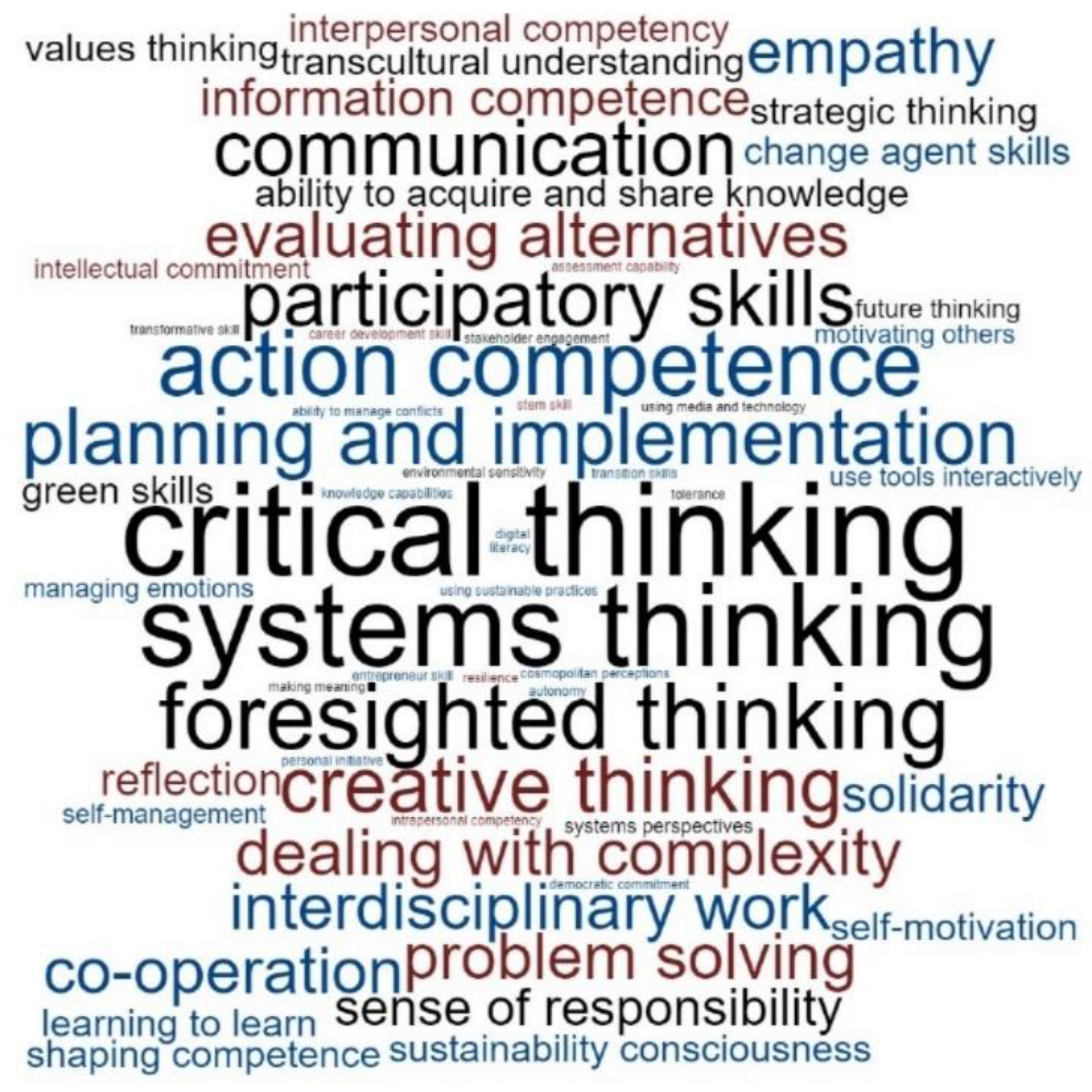
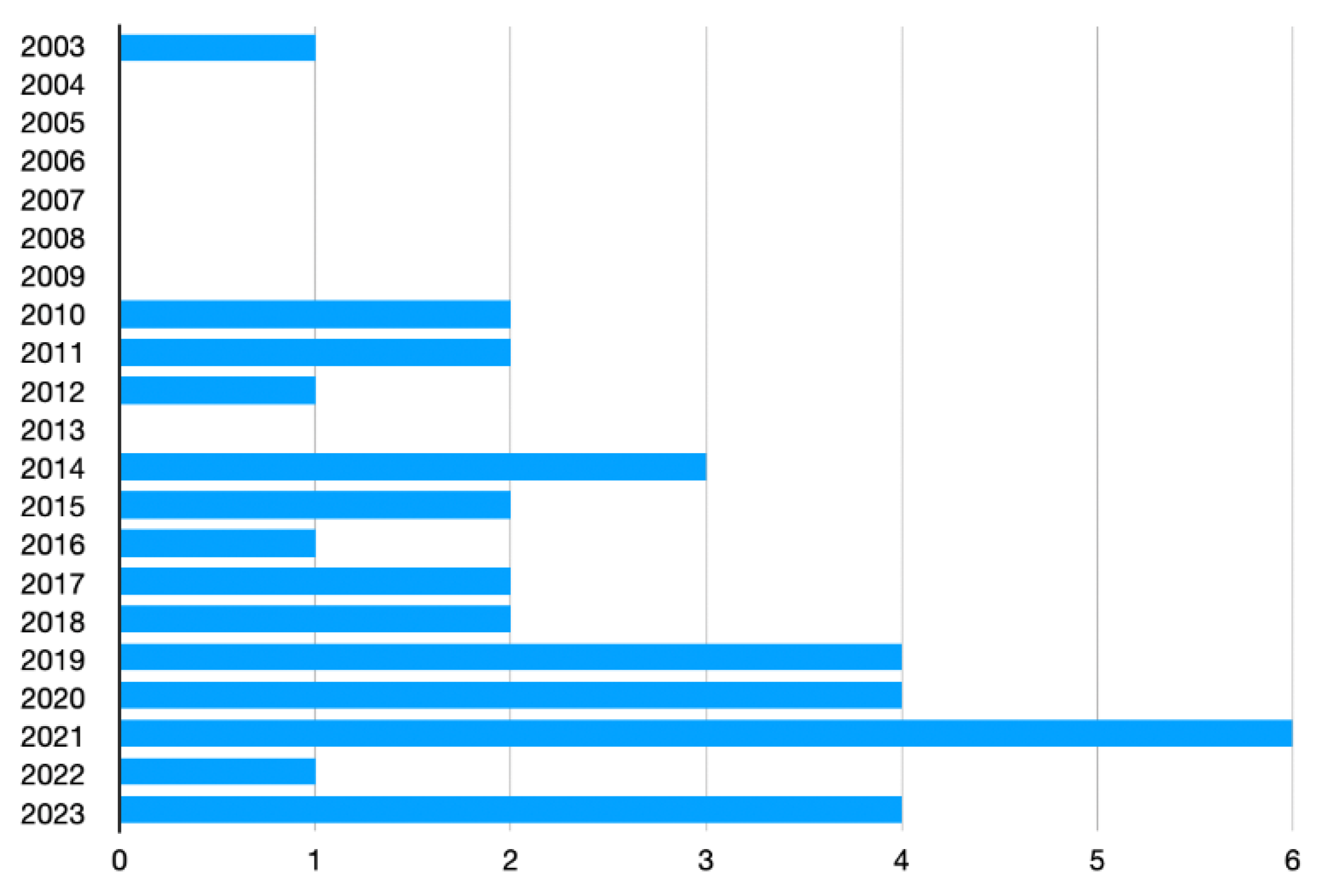
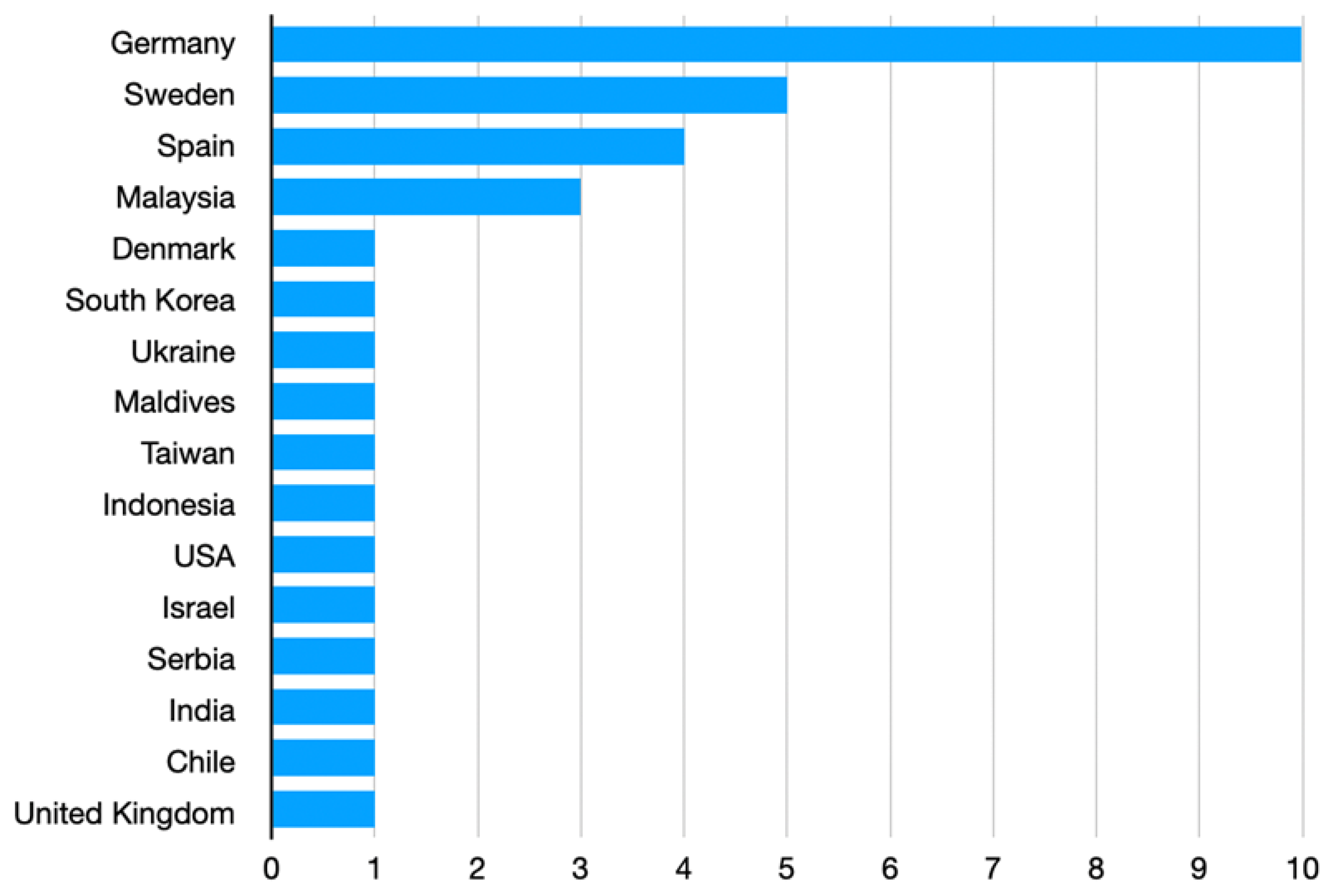
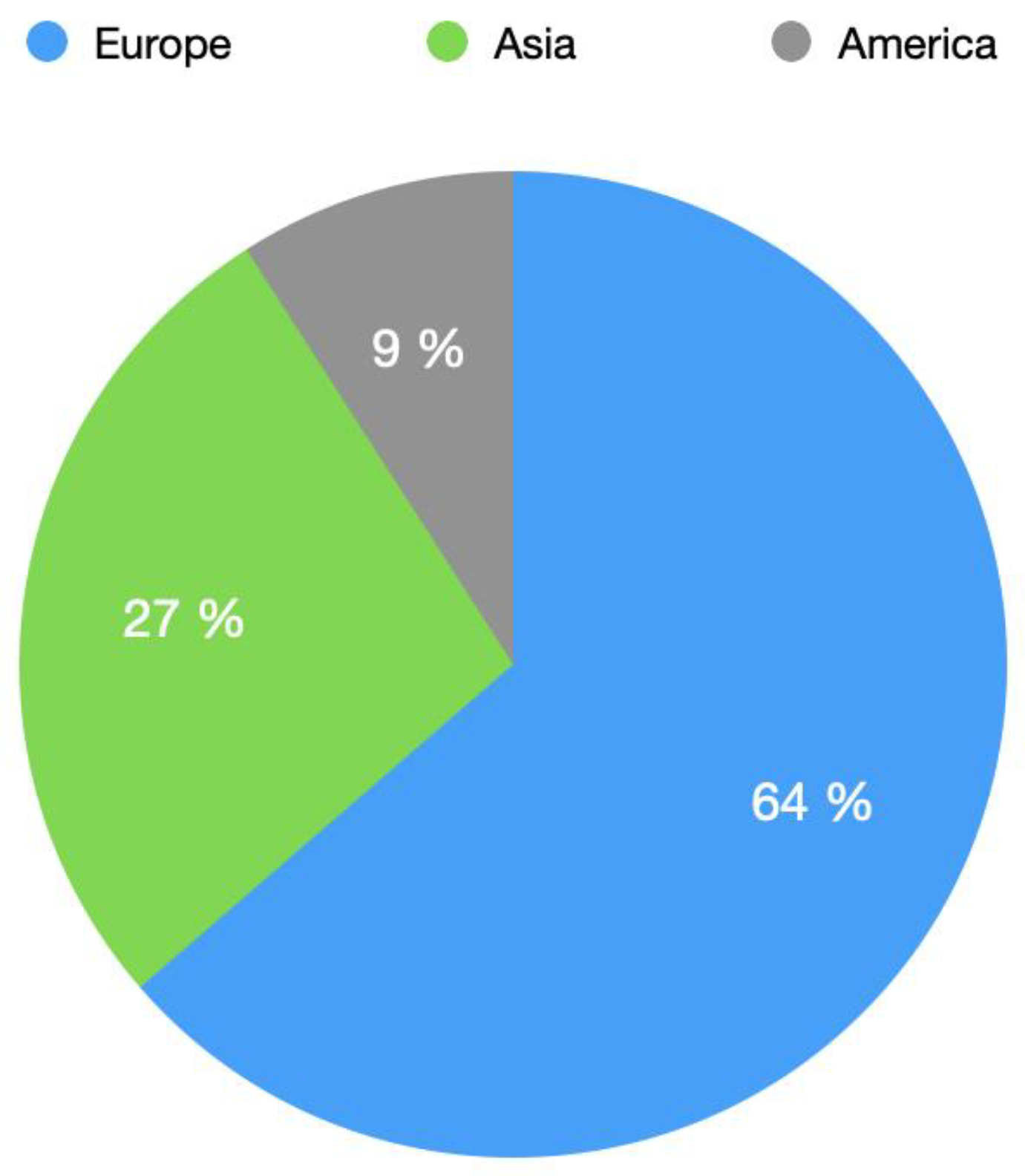

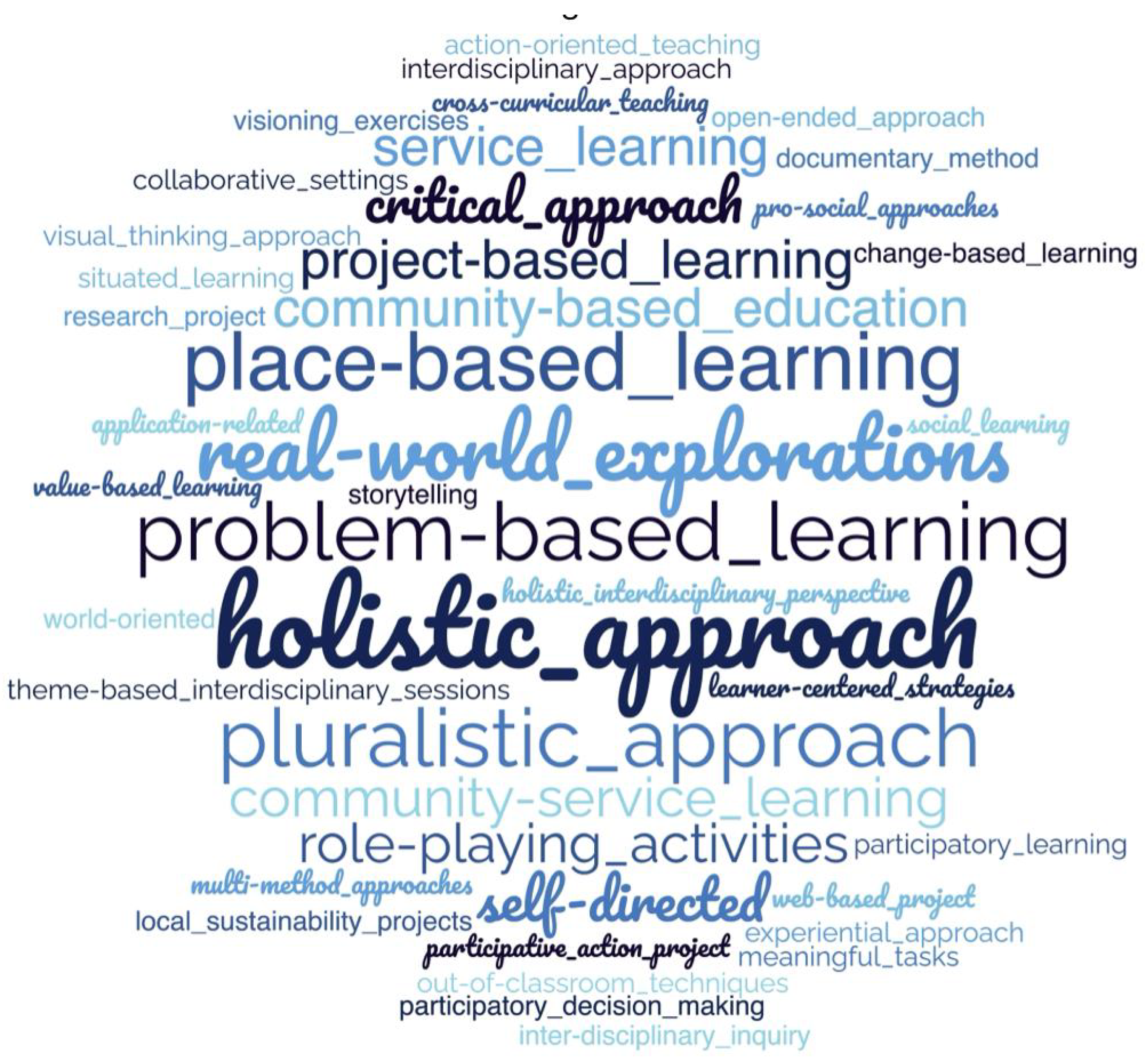
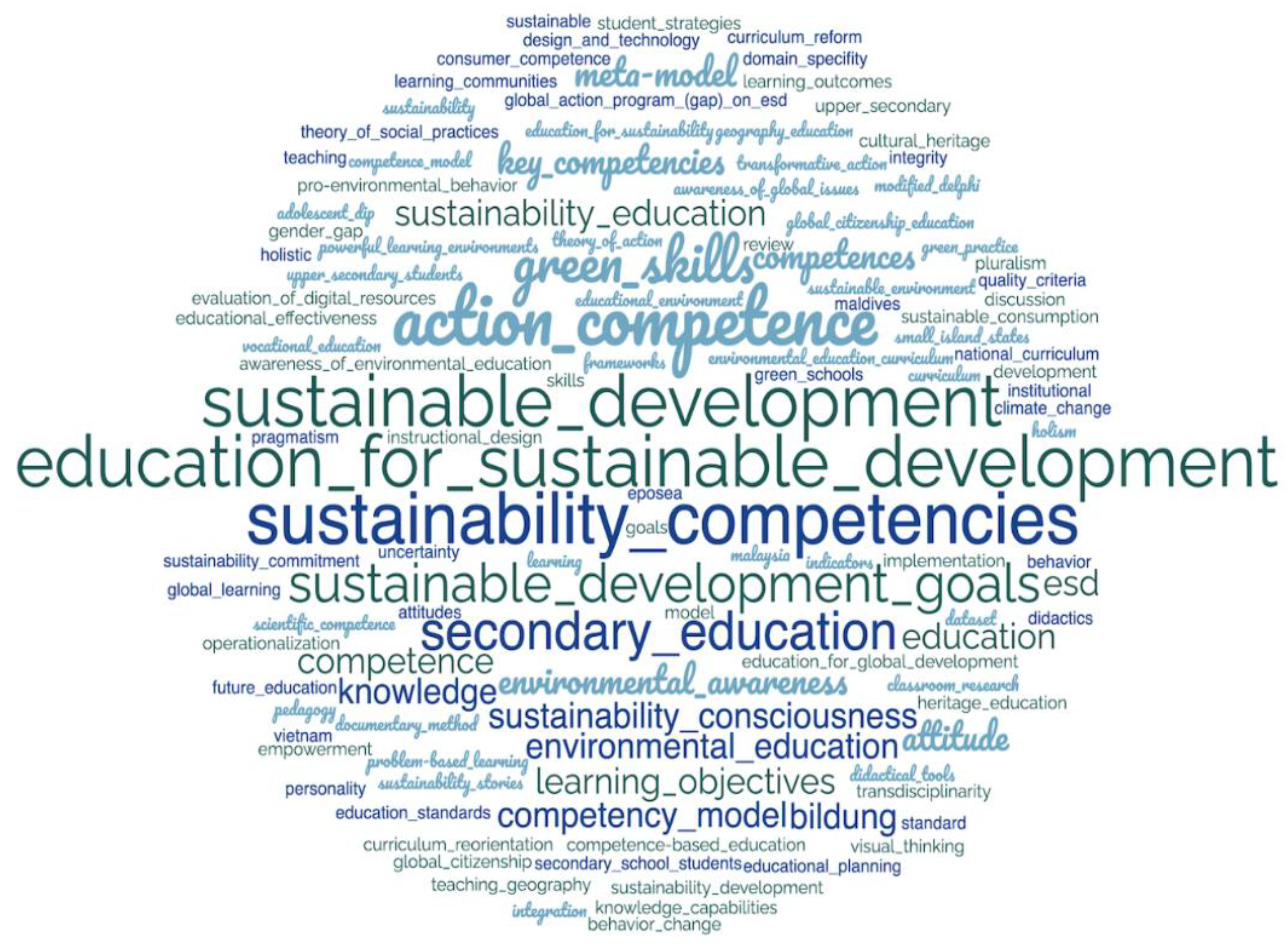
| Sustainability competencies concept | Definition | Related educational areas/ frameworks | Selected papers exploring the concept / citing the concept |
|---|---|---|---|
| Action competence | The concept of action competence includes the capacity to be able to act, now and in the future, and to be responsible for one's actions [66]. | Environmental Education | 5 / 9 |
| Gestaltungskompetenz (shaping competence) | Gestaltungskompetenz is a specific capacity to act and solve problems [5]. | Environmental Education;OECD’s DeSeCo project (2005) | 1 / 7 |
| Sustainability consciousness | The concept of sustainability consciousness taps into students’ knowingness, attitudes, and behavior in relation to the sub-themes to the environmental, social and economic dimensions of SD [61]. | Environmental Education, Democracy Education | 3 / 3 |
| Green skills | Green skills are the technical skills, knowledge, values and attitudes needed in the workforce to develop and support sustainable social, economic and environmental outcomes in business, industry and the community [68]. | TVET frameworks of CEDEFOP (2009) [73], OECD (2011) [74],Australian Green Skills Agreement | 3 / 3 |
| Competencies for transformative action | Sustainability “competencies” embody the concepts and skills that will enable students to understand and resolve complex sustainability problems by equipping them with the ability to become change agents [75]. | Theory of behavioral change | 1 / 2 |
| Shared perspectives on sustainability competencies frameworks | Countries, to which the studies pertain | Number of papers, dealing with this approach | |
|---|---|---|---|
| 1. | Set of transversal competencies for curricula or a certain education area | ||
| 1a. | Aligned with the priorities of national or regional education curricula/policies | South Korea, Maldives, Indonesia, Germany, Serbia, Croatia, Montenegro, Malaysia, Spain | 10 |
| 1b. | Derived from global education guidelines (UN, UNESCO, OECD, Earth Charter) | Germany, Spain, South Korea, Chile, Guatemala | 6 |
| 1c. | Domain-specific competencies (through the lens of school subjects or education domain) | Spain, South Korea, Malaysia, Maldives, Israel, Germany, Chile | 12 |
| 1d. | Domain-specific competencies (through the lens of teaching-learning approach) | Germany, Sweden, Maldives, Belgium, Spain, Israel, UK, India, Guatemala | 11 |
| 1.e | Frameworks originated from relevant conceptual research | Sweden, Belgium, Ukraine, Germany, USA, UK, Spain, India | 10 |
| 2. | Structural model for the relevant cognitive abilities, skills and attitudes | Germany, Sweden, Taiwan, Denmark, Indonesia, Malaysia | 11 |
| Name of the source | Competencies framework | Number of papers, citing the framework |
|---|---|---|
| UNESCO. Education for Sustainable Development Goals. Learning Objectives. 2017 [24] | Systems thinking competencyAnticipatory competencyNormative competencyStrategic competencyCollaboration competencyCritical thinking competencySelf-awareness competencyIntegrated problem-solving competency | 9 |
| Wiek, A.; Withycombe, L.; Redman, C.L. Key competencies in sustainability: a reference framework for academic program development. 2011 [20] | Systems-thinking competenceAnticipatory competencyNormative competencyStrategic competenceInterpersonal competenceProblem-solving competence | 8 |
| OECD. Definition and selection of key competencies. Executive summary. 2005 [17] | Interactive use of media and methods Interacting in socially heterogeneous groups Acting autonomously |
5 |
| UNESCO. Roadmap for Implementing the Global Action Programme on ESD. 2014 [79] | Critical and systemic thinking,Collaborative decision-making,Taking responsibility for present and future generations. | 7 |
| CEDEFOP. Future skill needs for the green economy. 2009 [73] | Green skills supporting: resource efficiency, the low carbon industry, climate resilience, and skills to protect manage natural assets | 4 |
| Nr. | Institution | Country | Number of affiliated researchers |
|---|---|---|---|
| 1. | Universiti Pendidikan Sultan Idris | Malaysia | 8 |
| 2. | Karlstad University | Sweden | 5 |
| 3. | University of Education Freiburg | Germany | 5 |
| 4. | Dnipro Academy of Continuing Education | Ukraine | 4 |
| 5. | University of Antwerp | Belgium | 4 |
| 6. | Diponegoro University | Indonesia | 4 |
| 7. | Linköping University | Sweden | 4 |
| 8. | University of La Laguna | Spain | 4 |
| 9. | Arizona State University | USA | 3 |
| 10. | Leibniz Insitute for Science and Mathematics Education | Germany | 3 |
| 11. | University of Goettingen | Germany | 3 |
| 12. | University of Niš | Serbia | 3 |
| 13. | Universidad Pública de Navarra Pamplona, Navarra | Spain | 3 |
| 14. | Leuphana University Lüneburg | Germany | 3 |
| Country | Number of affiliated researchers | Type of researched frameworks of sustainability competencies |
|---|---|---|
| Germany | 17 |
|
| Sweden (Taiwan) | 15 |
|
| Spain | 13 |
|
| Malaysia | 10 |
|
| Ukraine | 5 | framework originated from conceptual research [70]; |
| Belgium | 4 | structural model for relevant knowledge/skills/attitudes (sustainability consciousness, action competence) [71]; |
| Indonesia | 4 |
|
| Chile (Spain / India) | 4 |
|
| USA | 3 | framework originated from conceptual research (key competencies for transformative action) [75]; |
| Serbia | 3 | transversal key sustainability competencies based on national curricula/education policy [90]; |
| Denmark | 2 | structural model for relevant knowledge/skills/attitudes (action competence) [12]; |
| South Korea | 2 |
|
| India | 2 |
|
| Maldives (Australia/Italy) | 2 |
|
| Type of research paper | Research methods used | Number of papers | Countries | Number of researchers in co-authorship |
|---|---|---|---|---|
| Conceptual and quantitative research | Description of a frame model + close-ended questionnaires | 6 | Sweden, Germany, India | 2 to 3 researchers |
| Conceptual research | Description of a frame model, teaching approach, critical reflection, evaluation tool | 10 | Spain, Sweden, Malaysia, Germany, USA, Denmark | 1 to 4 researchers |
| Qualitative research | Analysis of curriculum, interviews, case-studies, documentary study, modified Delphi study | 12 | Spain, Malaysia, Maldives, Sweden/Taiwan, Belgium, UK, Serbia, Guatemala Germany, South Korea | 1 to 6 researchers |
| Conceptual and qualitative research | Description of a frame model + case study, literature review, longitudinal study | 3 | Germany, Ukraine, Belgium | 2 to 5 researchers |
| Quantitative research | SEM, cluster sampling method, close-ended questionnaires, cross-sectional study | 6 | Sweden, Malaysia, Sweden/Taiwan, India, Indonesia, Germany | 4 to 5 researchers |
| Qualitative and quantitative research (mixed-method design) | Class observations and semi-structured interviews, longitudinal study, experiment, analysis of teaching materials | 2 | Israel, Chile | 1 to 4 researchers |
| Nr. | Groups of clustered keywords | Number of keywords | % |
|---|---|---|---|
| 1. | Learning outcomes, competencies aspects | 48 | 27% |
| 2. | Education areas, related to sustainability | 35 | 19% |
| 3. | Education standards, curricula | 29 | 17% |
| 4. | Teaching methods and didactical tools | 25 | 13% |
| 5. | Research methods and tools | 20 | 10% |
| 6. | Sustainability | 17 | 9% |
| 7. | Countries | 8 | 4% |
| 8. | Educational psychology | 4 | 2% |
Disclaimer/Publisher’s Note: The statements, opinions and data contained in all publications are solely those of the individual author(s) and contributor(s) and not of MDPI and/or the editor(s). MDPI and/or the editor(s) disclaim responsibility for any injury to people or property resulting from any ideas, methods, instructions or products referred to in the content. |
© 2024 by the authors. Licensee MDPI, Basel, Switzerland. This article is an open access article distributed under the terms and conditions of the Creative Commons Attribution (CC BY) license (http://creativecommons.org/licenses/by/4.0/).





